Switchboard Unveils Enhanced Oracle Aggregator Network
Switchboard's new Oracle aggregator network enhances data security and customisation, aiming to reduce Oracle attacks.
 Bernice
Bernice
Jupiter is a transaction aggregator built on the Solana network. Jupiter was launched in October 2021 and has become the most popular trading front-end for Solana users. It aggregates more than half of Solana's transaction volume. The development of Jupiter's transaction aggregation function is close to the ceiling. The agreement launched the Launchpad platform Jupiter Start and the incubator Jupiter Labs for horizontal expansion. Jupiter has a large user base and resources, and the project quality of the Launchpad platform is guaranteed to a certain extent. And its Jupiter Labs derivatives project has high TVL and trading volume. To sum up, we choose to focus on Jupiter.
Investment Summary
Jupiter is built on A transaction aggregator on the Solana network with a user interface similar to 1inch. The protocol provides transaction aggregation, limit orders, and fixed investment functions. Jupiter aggregates more than half of Solana’s transaction volume, leaving little room for further development in transaction aggregation. The horizontal expansion of the protocol launches Jupiter Start and Jupiter Labs, which are similar to launch platforms. As of January 15, 2024, the agreement has not released financing information.
JupiterThe transaction aggregation function is approaching its peak. There is less room for improvement in the proportion of aggregated transaction volume on the Solana network. Jupiter has been the only competitive transaction aggregator on the Solana network. With a good trading experience and user interface, the protocol has developed so far. Its 24-hour transaction volume is approximately US$460 million. It is conservatively estimated that its aggregate transaction volume has exceeded 50% of the overall Solana network transaction volume, and there is little room for further improvement.
Jupiter StartAs a project promotion plan launched by Jupiter, it has great potential with the support of resources and user base. Jupiter has launched Jupiter Start, which is similar to a launch platform. At present, the key functions Launchpad and Atlas functions have not been launched yet, but Jupiter has a huge user base of Solana network, superimposed on its own Jupiter Labs Project resources and cooperation projects, the quality of the Jupiter Start project is guaranteed to a certain extent, and this feature deserves attention.
Jupiter The Labs project is a fork version of other chain star products and has great potential under the promotion of Jupiter. The two projects temporarily launched by Jupiter Labs are derivatives and LSD stable currency, which are very similar in form to GMX V1 and Lybra. The derivatives project is currently in the use stage. The average trading volume is close to 90 million US dollars (limited by TVL). It can be seen that, driven by Jupiter, Jupiter Labs' products have attracted market attention and attracted more users and funds. The subsequent LSD stablecoin protocol made minor innovations in the lending rate and redemption mechanism, filling the gaps in Solana-related fields.
Overall, Jupiter has no competitors in Solana’s transaction aggregation section, and aggregates more than half of the transaction volume, making DEX more competitive in Solana. It became the underlying liquidity protocol. With the support of a huge user base and project resources, its horizontal expansion of Jupiter Start and Jupiter Labs also have strong market potential, and Jupiter Start and Jupiter Labs may have a linkage effect. Based on the above conditions, we choose to focus on Jupiter.
Explanation: The final evaluation of [Concern]/[Not Concern] for the first-class warehouse is based on the comprehensive analysis of the current fundamentals of the project in accordance with the first-class warehouse project evaluation framework The results of the analysis, rather than a prediction of the future price rise or fall of the project token. There are many factors that affect the price of tokens, and project fundamentals are not the only factor. Therefore, just because the research report is judged as [not paying attention], it does not mean that the project price will definitely fall. In addition, the development of blockchain projects is dynamic. If a project judged by us to be "not concerned" undergoes significant positive changes in its fundamentals, we may adjust it to "concerned". Likewise, if a project judged by us to be "not concerned" If a project that is [Follow] undergoes major malignant changes, we will warn all members and may adjust it to [Not Follow].
1. Basic overview
1.1 Project Introduction
Jupiter is a transaction aggregator built on the Solana network , Jupiter aggregates more than 50% of the transaction volume on the Solana network and is the first choice for users to trade. The development of its aggregation function has approached the ceiling, and the protocol is undergoing horizontal expansion to further develop. Jupiter has launched two major functions, the launch platform Jupiter Start and the incubator Jupiter Labs, to increase its influence.
1.2 Basic information
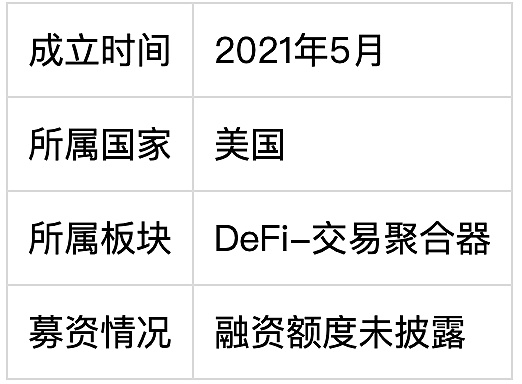
2. Project details
2.1 Team
The main members of the team are Meow and Ben Chow, who founded Jupiter in May 2021. At the same time, they are also members of Meteora, the liquidity platform on Solana.

Co-founder—Meow:Co-founder of Jupiter, builder of DEXMeteora on Solana.
< p style="text-align:center">
Co-founder—Ben Chow:Has many years of experience in interaction design and products, one of the founding team members of the social game company Hive7, and the co-founder of many companies. In May 2021, Ben and Meow founded Jupiter Aggregator.
2.2Funding
Jupiter did not announce any financing.
2.3 Code
Jupiter is audited by OtterSec. OtterSec has audited well-known projects such as Solana, Aptos, Sui, and Wormhole (mostly well-known Solana projects and U.S. project). It has relatively rich audit experience and a certain reputation in the industry.
2.3 Products
As a transaction aggregator built on the Solana network, Jupiter is one of the main choices for Solana trading users. It currently mainly provides transaction aggregation, limit orders, DCA/fixed investment, Jupiter Start four major functions. At the same time, Jupiter Labs has joined forces with the community and users to launch independent projects, currently including perpetual contract products and LSD stable coins.
2.3.1Transaction aggregation
Same as most transaction aggregators , users can select a trading pair and enter the transaction amount in Jupiter, and Jupiter will automatically find the optimal exchange path in supported decentralized exchanges. For tokens that only have liquidity on individual DEXs, transaction aggregation Liquidity can be found directly. For tokens with larger transaction volumes, transaction aggregation may provide better transaction prices/slippages through multi-paths. Before trading, users can choose to modify transaction fees, slippage size and Whether to use direct path and other parameters.
Jupiter's trading interface is relatively neat (similar to 1inch) and the trading experience is better. You can adjust the language and block browsing in the settings. servers and RPC nodes to adapt to different needs and avoid single points of failure. Jupiter currently supports 29Applications that include trading functions. DEX must meet certain conditions to be integrated by Jupiter, which mainly include liquidity and security audits. DEX requires at least US$500,000 in liquidity to ensure certain trading volume requirements, and secondly, the code needs Audited to ensure security.
Jupiter aggregates the majority of trading volume on Solana, in part due to user interface issues. Liquidity on Solana The strongest DEX is Orca, which accounts for $190 million in liquidity. The second is Raydium. Except for Raydium’s own protocol token RAY, Orca has more liquidity than Raydium in other mainstream tokens. But Orca’s own trading volume Often not as good as Raydium (most of Orca’s trading volume comes from Jupiter aggregation). Orca’s trading interface is not a conventional Uniswap-like operating interface. Instead, you can choose buy/sell and then enter the amount, which is not in line with the user’s operating habits. Secondly, WIF has not joined Orca's whitelist (you need to enter the contract address to search). Although Orca can meet users' small-amount transaction needs, the transaction experience is far inferior to Jupiter.

Figure 2- 1 Orca trading interface[1]
Secondly, the overall liquidity of the tokens on Solana is not strong. Using an aggregator for large transactions can reduce a certain amount of slippage loss. Taking SILLY as an example, the slippage loss of using one million USDC to exchange SOL is close to 1.22%. Using Jupiter, the slippage loss is close to 0.4%, that is, the aggregator can reduce the slippage loss/price impact by 0.8%.
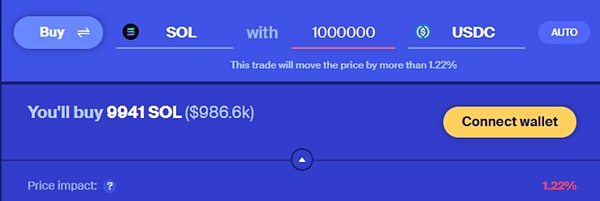
Figure 2-2 Orca SOL/USDC large amount Transaction display
In general, the main reasons for Jupiter's large-scale application are user interface, liquidity and airdrops. And after getting used to using aggregators, users will first use aggregators instead of DEX for transactions, which has a certain degree of user stickiness.
2.3.2Limit Order
Jupiter also provides a limit order function. Limit orders avoid cost increases and slippage problems caused by price effects during transactions (there is no MEV problem). Limit orders can be partially filled and receive a portion of the trading tokens without being fully filled. When trading, users can choose the order validity period, exchange price and exchange quantity. The protocol cooperates with Birdeye and TradingView. Birdeye provides on-chain price data of tokens, and Jupiter uses TradingView's technology to display chart data. The overall trading experience is very similar to that of a centralized exchange.
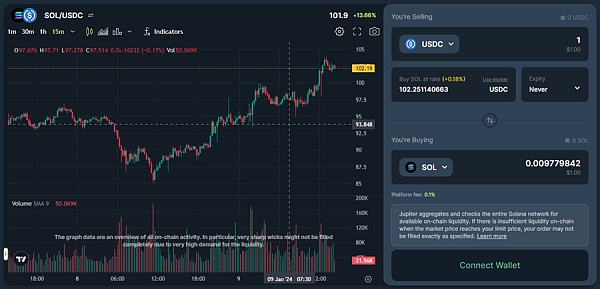
Figure 2-3 Jupiter Limit price order function display
2.3.3DCA/fixed investment
DCA (Dollar Cost Averaging) is called the dollar average Cost method, also called fixed investment. Amortize the cost of purchase by making multiple investments over a certain period of time. Jupiter provides fixed betting with a minimum frequency of minutes and a maximum frequency of months. Users can choose the frequency of fixed investment, the total time period and the price range of fixed investment.
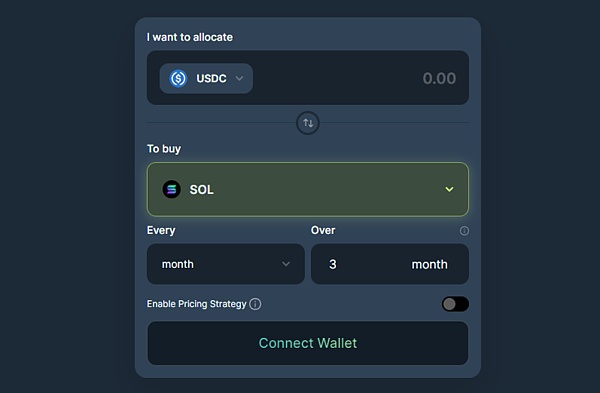
Figure 2-4 Jupiter fixed investment interface display
When the fixed investment starts, the tokens will be transferred to the fixed investment tokens Related accounts, and perform trading operations at regular intervals (transactions may have changes of 2-30 seconds to prevent MEV). After the transaction is completed, the fixed investment account will be closed automatically and all tokens will be transferred to the wallet. The agreement charges a one-thousandth fee for fixed investment. Fixed investment is suitable for accumulating tokens in bear markets and gradually selling less liquid tokens, but the overall demand is less.
2.3.4Jupiter Start
Jupiter will establish its own project promotion platform, Jupiter Start, dedicated to promoting the development of new projects while protecting the interests of investors. Jupiter The Start process is divided into five sections: social introduction, education, pre-launch, Launchpad and Atlas. The community introduction will last for a week, mainly introducing the project's concept, economic model, etc. and conducting community discussions. Education will place individual projects as part of the website, with partially qualified users earning tokens through reading materials and on-chain operations. Pre-listing allows users to place limit orders and DCA operations before liquidity is added.
Currently, community introduction, education and pre-launch functions have been launched, and the ones worth looking forward to are Launchpad and Atlas (not yet explained) functions. Since Jupiter Labs’ projects will issue their own protocol tokens, its Launchpad project may be a derivatives project.
2.3.5Jupiter Labs
Jupiter Labs is independent of Jupiter. Jupiter Labs projects will eventually operate independently, and Jupiter users and the community will receive certain priority rights and token incentives. The projects currently launched by Jupiter Labs are perpetual contracts and LSD stablecoins.
Jupiter Perpetual
Jupiter Perpetual is A derivatives protocol similar to GMX V1 launched by Jupiter Labs is currently in the use stage. Protocol users are mainly divided into liquidity providers and traders. The liquidity provided by the liquidity provider is converted into a basket of tokens (currently including BTC, ETH, SOL, USDC, and USDT). The tokens in the pool with higher weights are mainly SOL and USDC, that is, the main trading target is SOL. .
When a trading user conducts leverage trading, the trader borrows the tokens in the pool to establish a leveraged position. Users of this derivatives trade do not need to bear transaction slippage, but only pay transaction fees and borrowing fees, which depend on the utilization of the token. Liquidity providers receive 70% of transaction fees and all borrowing fees. Correspondingly, liquidity providers also bear the risk of losses caused by traders' profits and token depreciation. From the end of 2023 to now, the price of JLP has been fluctuating around $1.8.
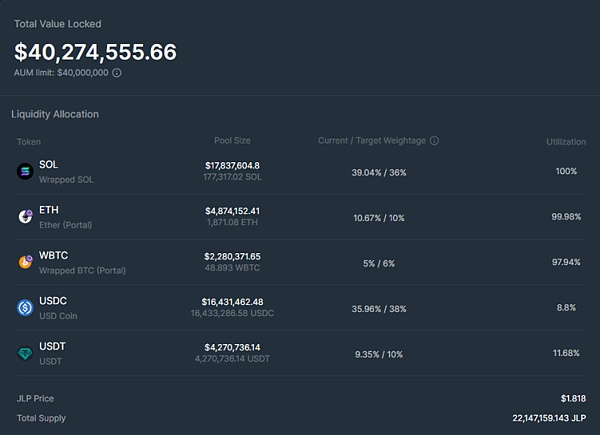
Figure 2-5 JLP data[2]
LST Stable Coin
Jupiter Labs The LST stablecoin protocol XYZ has not been launched yet. According to its documentation, the protocol is similar to Lybra V1. Users can mint the interest-bearing stablecoin SUSD (without borrowing interest) by staking SOL. The protocol obtains staking income through the pledged LST, and the income will be distributed to SUSD holders and the governance token of the agreement. The main feature of the agreement is that when the LST yield is higher than the SOL borrowing rate, SOL LST will be mortgaged in the lending agreement and used to lend SOL and replace it with LST, using leverage arbitrage to maximize returns. Secondly, among possible additional mechanisms, the protocol adopts a redemption mechanism to ensure the stability of SUSD prices. Frequent redemptions may affect the borrower's position, especially when market fluctuations oracles are delayed (SUSD holders exchange SUSD for borrowers' LST). The protocol does this by introducing small price range governance token redemptions. Reduce the impact on borrowers. When the price of SUSD is between $0.95 and $1, the protocol may use SUSD to redeem governance tokens to reduce the frequency of borrower redemptions.
Using leverage arbitrage while increasing returns also brings additional protocol and oracle quotation risks to borrowers and SUSD holders. Borrowers need to be more careful High governance token incentives to maintain a certain amount of SUSD minting. Redemption of governance tokens in small price ranges can significantly alleviate the impact of redemption on borrowers' positions, but it also brings new problems. Small-amount range governance token redemptions will result in the vast majority of redemptions being governance token redemptions. If the price continues to be below 1 US dollar, it will cause a more serious token issuance.
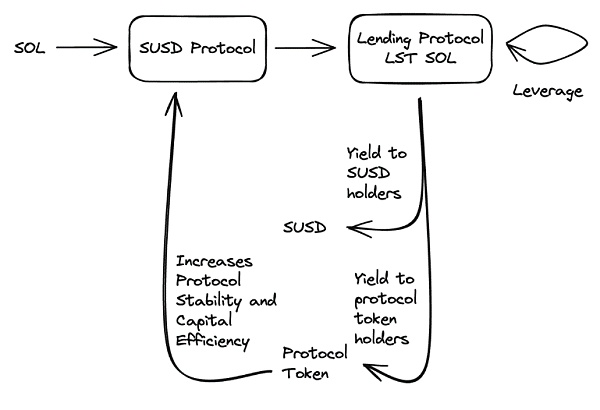
Figure 2-6 XYZ operation logic[3]
Summary: Jupiter provides transaction aggregation, limit orders and fixed investment functions. The overall trading method is very similar to 1inch. The fixed investment function can set the price range, time and frequency, which is an additional function. Jupiter Start's Launchpad function and Atlas function have not been launched yet and may be the focus of subsequent development. Jupiter Labs, launched by the protocol, is incubating two new protocols, namely derivatives and LSD stablecoin. The new protocols will operate independently in the future and give Jupiter users and the community certain priority rights and incentives.
3. Development
3.1 History
Table 3-1 Prisma Finance major events
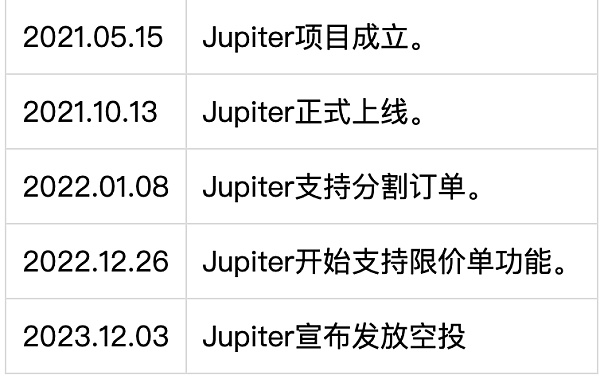
3.2 Current Status
3.2.1Business Data
Jupiter is the only competitive transaction on Solana As an aggregator, a large portion of the trading volume on the Solana network is conducted through Jupiter. Looking at the trading volume in November and December, the total trading volume of DEX on the Solana network was 8 billion and 28 billion US dollars respectively, and Jupiter was in these two The monthly aggregated trading volumes were US$3.9 billion and US$17 billion respectively. In terms of trading volume, Jupiter guided more than half of the DEX trading volume on Solana, that is, users used Jupiter transactions more than the front-end of DEX, truly realizing The existence of DEX as the underlying protocol for liquidity.
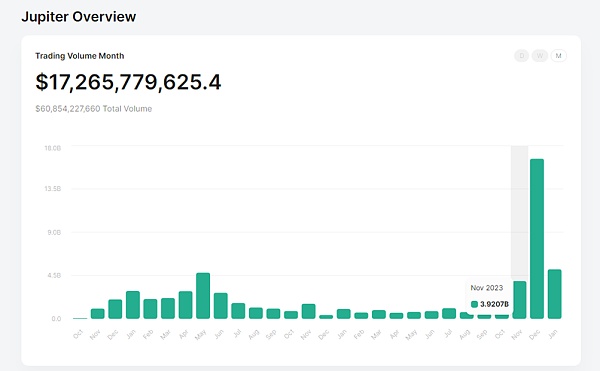
Figure 3-1 Jupiter monthly transaction data[4]< /span>
Jupiter currently aggregates the liquidity of 29 protocols, among which the transaction volume generated through transaction aggregation ranks top The five protocols are Orca, Raydium, Phoenix, Lifinity and Meteora. The top five protocols account for nearly 90% of Jupiter’s transaction volume. One of them worth mentioning is Meteora. Meteora’s team members also include Meow and Ben Chow. Formerly known as decentralized exchange Mercurial Finance. After the FTX thunderstorm, Mercurial Finance announced its suspension and snapshot token holders received 20% of Meteora tokens, and Jupiter will launch tokens/add liquidity on Meteora , Meteora has currently started an incentive plan for liquidity providers (10% of tokens will be allocated to LP before adding liquidity).
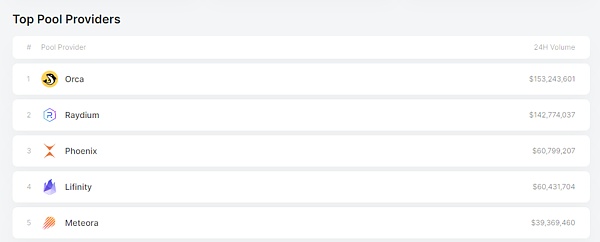
Figure 3-2 Jupiter DEX trading volume data
3.2.2Social media scale
 < /p>
< /p>
As of January 15, 2024, Jupiter has a large community scale and Discord is highly active, mainly discussing issues related to JUP airdrops and Meteora liquidity.
3.3 Future
Jupiter currently does not have a clear roadmap. Considering that the protocol is about to issue tokens, further action should be to establish a DAO for protocol governance. Jupiter Start's Launchpad and Atlas functions will be launched in the future. As a star project on Solana, Jupiter has a large user base, and Jupiter Start can also gain certain resource advantages.
Summary: Since Jupiter went online in October 2021, Jupiter has obtained a large amount of transaction volume. With the FTX thunderstorm, the DEX with the highest TVL became Orca (the trading experience given by the user interface is slightly insufficient). Raydium has a higher TVL and the liquidity of some Tugo tokens. Jupiter has won the favor of more users with its ease of use and comfortable user interface. As of January 15, 2024, more than 50% of transaction volume occurs on Jupiter. The subsequent Launchpad function is worth looking forward to.
4. Economic model
< strong>4.1 Token Allocation
Jupiter’s token is JUP, with a total amount of 10 billion. 40% of the tokens (10% in the first round, 4 rounds in total) will be used for airdrops, 20% will be used for liquidity and community incentives, and 40% will be used as team and strategic reserves. The protocol promises to allocate 50% of the tokens to the community and allocates a cold wallet to the team and the community. The initial circulating tokens are expected to be 5% for adding liquidity and 10% of the airdrop tokens (there may be additional About 2% of tokens are unlocked)
4.2 Token utility
Jupiter has not yet announced the specific functions of the token JUP. The author believes that in the short term, JUP will mainly be used for community governance. Subsequent new projects from Jupiter Labs may airdrop and give priority testing rights to JUP holders. At the same time, Jupiter may follow the example of 1inch and provide positive slippage income to stakers.
5. Follow-up questions
Jupiter has Aggregating 50% of the transaction volume on Solana, the main subsequent development lies in the protocol’s Jupiter Start function and Jupiter Labs.
5.1 Solana DEX Industry Overview
Jupiter has always been the only competitive transaction aggregator on the Solana network. Because of its smooth user experience and relatively comfortable user interface, Jupiter has attracted more and more users. Jupiter aggregates more than 50% of the trading volume on Solana, making DEX a true underlying liquidity protocol on the Solana network. With the further development of the protocol and subsequent airdrop plans, the proportion of transaction volume aggregated by Jupiter is expected to further increase. Jupiter has occupied almost all of Solana’s aggregator market, and further development lies in the further optimization of Solana itself rather than its own.
5.2 Jupiter Start
< p style="text-align: left;">With limited further growth in transaction aggregation, Jupiter Start or Jupiter is another way to expand its territory. CurrentlyJupiter Start only has introduction, education and pre-launch functions. Jupiter Start’s core function Launchpad has not yet been launched. Jupiter has a huge user base and a strong traffic effect. Considering its own resource advantages, projects launched on it are likely to be of higher quality.5.3 Jupiter Labs
Jupiter Labs cooperates with JUP DAO, Solana community, and Jupiter users to launch a new DeFi protocol. Projects in Jupiter Labs will eventually operate independently, but Jupiter users, communities and token holders will have early priority rights and token rewards, and Jupiter Labs projects may also be launched on Jupiter Start.
The products currently launched by Jupiter Labs are derivatives protocols and LSD stablecoins. The derivatives protocols are already in the early stage of use, and the liquidity (JLP) is limited to 5,000 Within 10,000 US dollars, the overall agreement is very similar to GMX V1. Another protocol is the LSD stablecoin protocol XYZ, which is similar to Lybra as a whole V1, but based on Lybra, it increases the income of stablecoin holders and protocol token holders through interest rate arbitrage (mortgaging LSD to lend SOL and replace it with LSD). At the same time, on the basis of other stable currency protocols directly redeeming collateral to maintain prices, XYZ uses governance tokens to redeem the borrower's position when a small amount is unanchored (5%), while protecting the borrower. while increasing the dilution risk of governance tokens.
Summary: Jupiter's own transaction aggregation business has almost reached its ceiling. It has adopted a strategy of horizontal expansion into the DeFi sector and launched the Launchpad platform Jupiter Start and incubation PlatformJupiter Labs. Jupiter has a strong resource advantage (its own huge user base and Jupiter Labs project), and the Launchpad project deserves attention. Although its Jupiter Labs has less innovation, it has filled the gaps in related projects on Solana. With the support of Jupiter, it still has more Great potential.
6. Risk
1) Code risk:Jupiter is audited by OtterSec, but there are still code risks.
2) Derivatives project risks:Derivatives projects are still in the Beta stage, and there may be oracle attacks and other hollowing out of protocol liquidity. The risk[5].
Switchboard's new Oracle aggregator network enhances data security and customisation, aiming to reduce Oracle attacks.
 Bernice
BerniceA 17-year-old investor's strategic use of Jupiter's tools led to over $1 million from the $JUP airdrop, emphasising precision in transactions and daily engagement. The success story accompanies Jupiter's $700 million airdrop, sparking market excitement, with cautious optimism advised for those seeking to replicate the strategies.
 Joy
JoyJupiter's JUP token launch brings promise, but in the ever-changing crypto landscape, vigilance is key for investors as challenges and opportunities unfold.
 Huang Bo
Huang BoJupiter, which has grown into one of the most popular protocols in the entire cryptocurrency space, is about to launch its native token $JUP amid strong product-market fit and a potential bull run.
 JinseFinance
JinseFinanceOKX adds JUP spot trading, enhancing Solana's liquidity options. Users benefit from increased accessibility and diverse trading opportunities on the platform, showcasing OKX's commitment to cryptocurrency market innovation.
 Xu Lin
Xu LinPhantom announces Jupiter's Solana airdrop. Decentralized stablecoin with high DeFi transactions. JUP token empowers governance. Initial airdrop for pre-November 2, 2023, users; stay engaged for future opportunities.
 Huang Bo
Huang BoAevo's launch of JUP Pre-Launch Futures at 0.2183 USDT marks a pivotal moment. With airdrop initiatives and a current JUP price at 0.2138 USDT, the crypto community eagerly anticipates market dynamics.
 Edmund
EdmundOpenSea’s new offering is a rebranding of an existing product – Gem v2.
 cryptopotato
cryptopotatoUniswap Labs, one of DeFi's most prominent decentralized exchanges, has acquired an NFT marketplace aggregator for an undisclosed amount, a ...
 Bitcoinist
BitcoinistTEL AVIV, Israel, May 16, 2022: Leading, payments-focused blockchain player Fuse today announced a full integration of the Fuse Network ...
 Bitcoinist
Bitcoinist